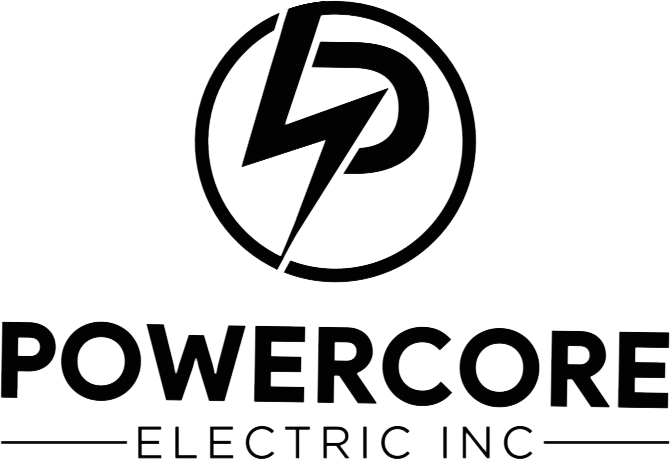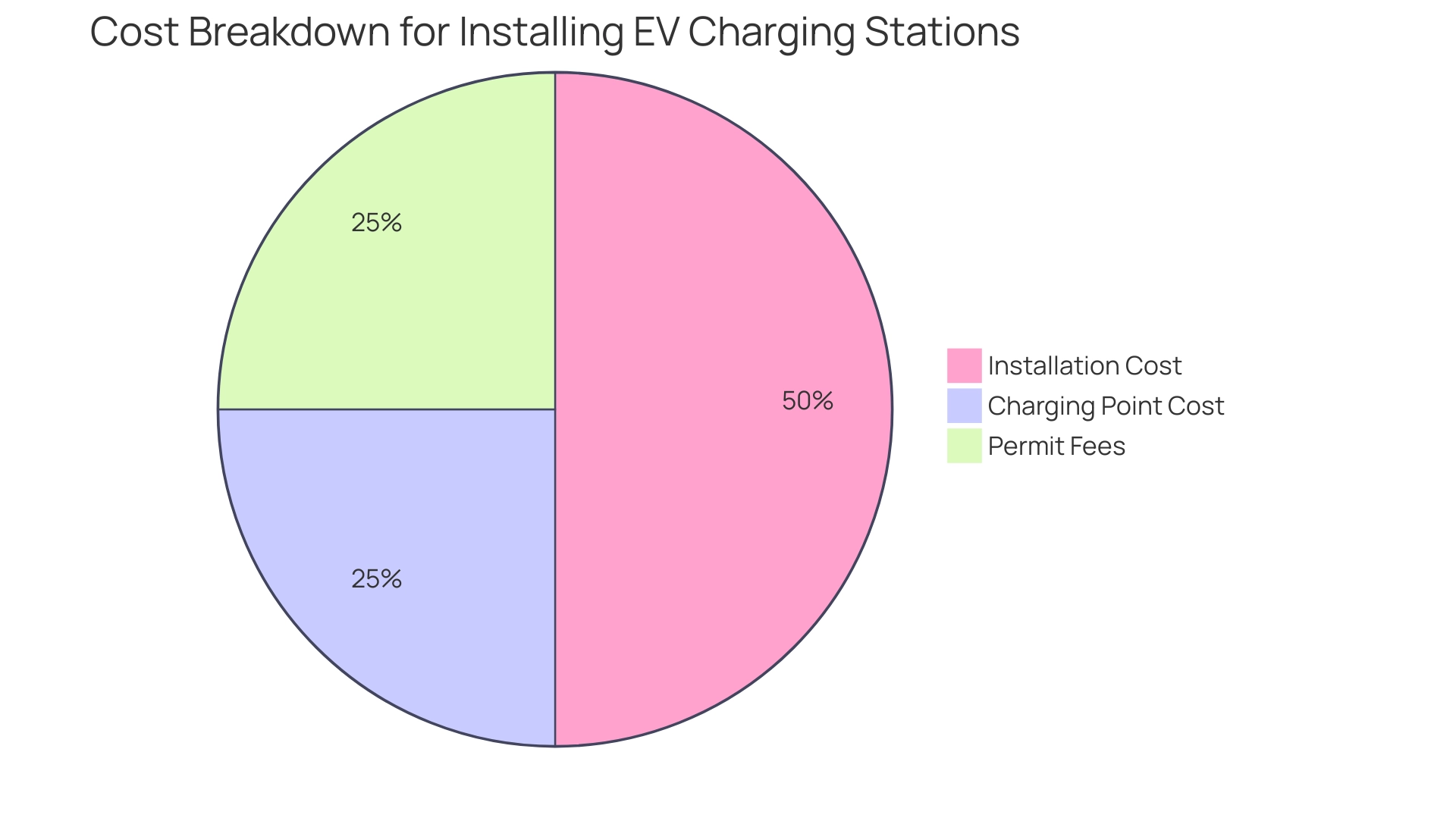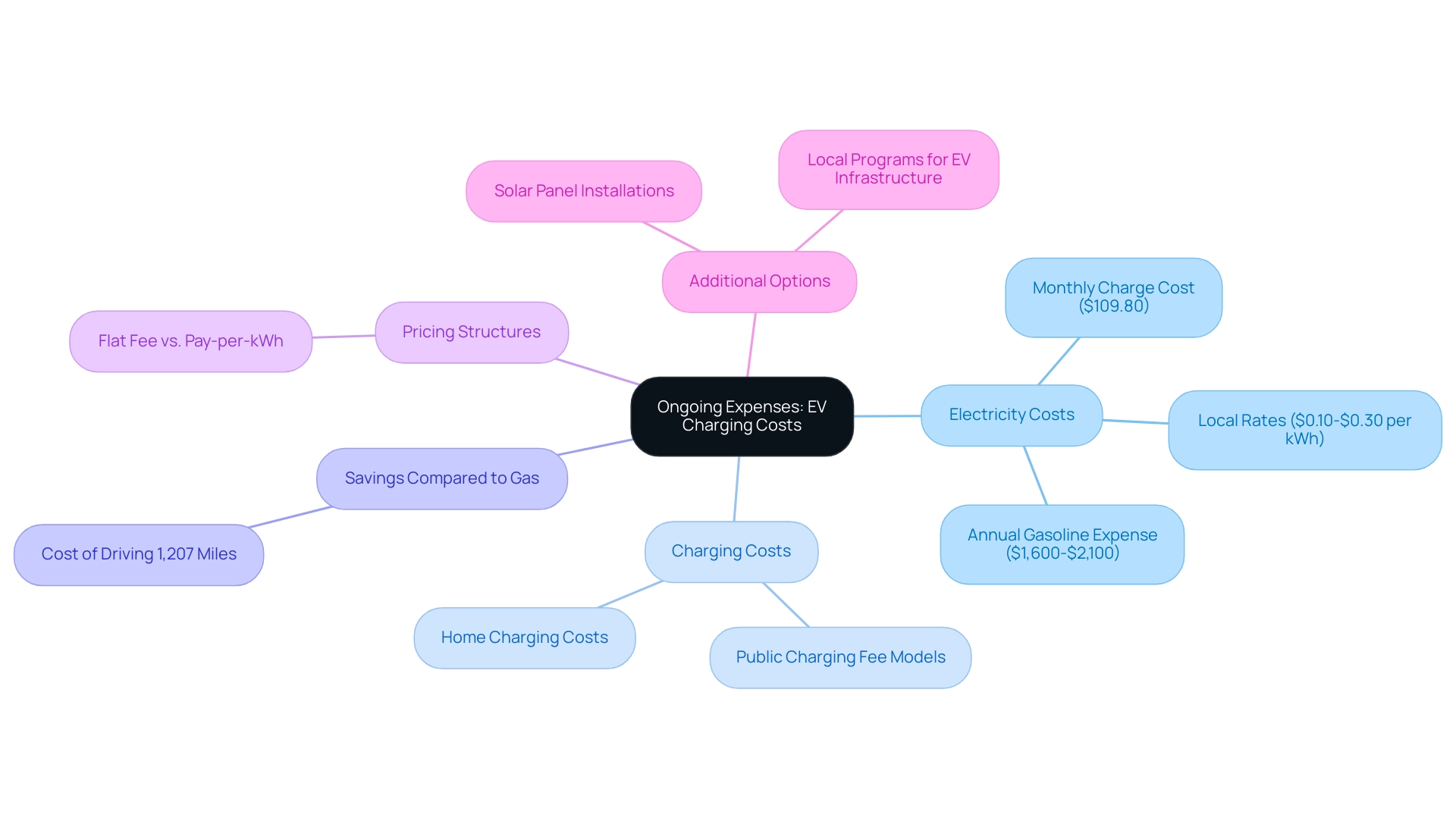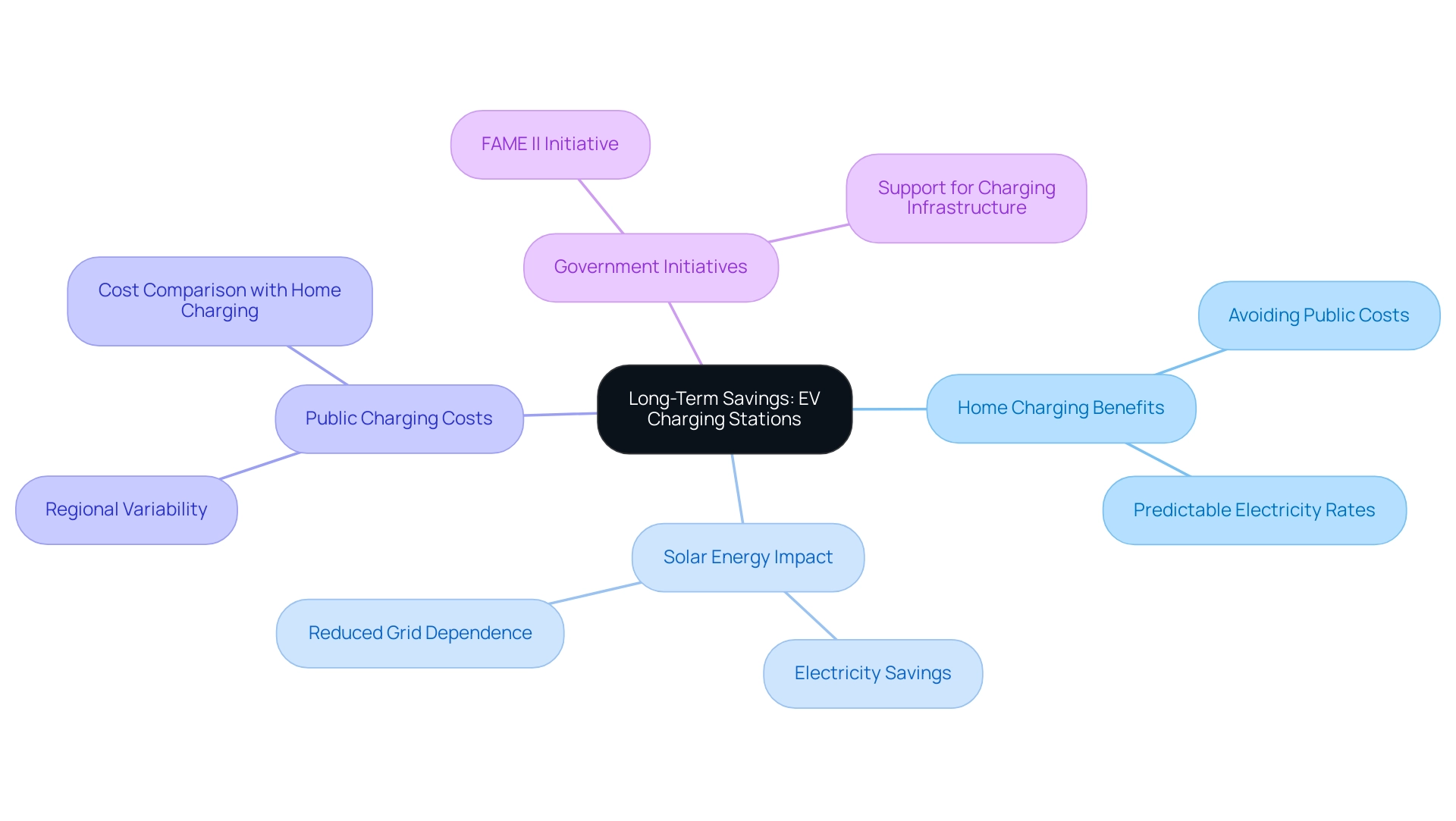Introduction
Installing an electric vehicle (EV) charging station at home is more than just a step towards sustainable living; it’s an investment that can reshape how homeowners think about energy and transportation. With the rise of electric vehicles, understanding the costs involved—from the initial purchase and installation to ongoing electricity expenses—can feel overwhelming. Yet, navigating these details is essential for making informed decisions that align with both budget and lifestyle.
Fortunately, there are also incentives and rebates available that can ease the financial burden, making the transition to EV ownership even more appealing. As the landscape of charging infrastructure continues to evolve, so too do the opportunities for long-term savings and enhanced energy efficiency.
Whether you’re just beginning to explore options or you’re ready to dive in, this guide will illuminate the key factors to consider when investing in an EV charging station for your home.
Understanding the Costs of Installing EV Charging Stations
When it involves setting up an electric vehicle (EV) refueling point at home, there are several significant expenses, such as the car charging point cost, that you’ll want to take into account. The initial significant cost, which includes the car charging point cost, is the power hub itself, usually falling between $300 and $1,200, differing according to the model and features you select. Then, there’s the installation expense, which can fluctuate quite a bit depending on the car charging point cost and your specific situation.
Generally, the installation will incur a car charging point cost ranging between $500 and $2,000. Factors like how far your charging station is from your electrical panel and whether you need any electrical upgrades can significantly influence the car charging point cost. Don’t forget about permits! The car charging point cost can vary between municipalities due to differing fees for obtaining necessary permits, adding another layer to the overall expense.
So, it’s essential to have a clear understanding of the expenses, including the car charging point cost. This knowledge not only helps in planning your budget but also sets the stage for appreciating the long-term savings and benefits that come with electric vehicle ownership. Furthermore, overseeing usage and incorporating energy management systems are essential for enhancing scheduling and ensuring economical operations.
At Powercore Electric Inc., we provide extensive services customized to your requirements, including:
- Solar panel setups that can greatly lower your energy expenses
- Battery backups to guarantee you have power during outages
- Professional installation of electric vehicle refueling stations
Our solutions are designed to enhance energy efficiency and sustainability for eco-conscious homeowners. If you’re looking for expert guidance on these solutions, feel free to reach out!
You can contact Ryan Serrano at (916) 699-8778 or email ryan.serrano@powercoreinc.net. As the future of EV refueling infrastructure appears promising—particularly with thrilling advancements such as BluSmart’s $25 million investment for nationwide EV refueling expansion—making informed choices today will pave the way for a greener tomorrow. As Tajammul Pangarkar, CMO at Prudour Pvt Ltd, insightfully notes, the evolution of technology is critical in shaping how we approach energy consumption and infrastructure development.
Our satisfied customers have shared their positive experiences with our services, highlighting the efficiency and reliability of our installations, which further emphasizes the value we bring to your energy solutions.
Ongoing Expenses: Electricity Costs and Pricing Structures for EV Charging
When evaluating recurring expenses for electric transport, electricity expenses are the main factor. Homeowners can expect to pay between $0.10 to $0.30 per kilowatt-hour (kWh), depending on local utility rates. For instance, replenishing a standard electric auto with a 60 kWh battery may require between $6 and $18 for a complete charge.
Interestingly, if you travel about 1,207 miles monthly, powering an EV amounts to around $109.80, considerably less than the yearly refueling expense of approximately $1,600 to $2,100 for gasoline vehicles. Additionally, the car charging point cost at public refueling stations can vary; some may charge a flat fee per session while others use a pay-per-kWh model. It’s essential for EV owners to factor in the car charging point cost along with other ongoing costs when evaluating the total cost of ownership.
Numerous utility companies, including those catering to Southern California, provide special rates specifically for EV use, which can help lower costs even more. Powercore Electric Inc. supports this transition towards sustainable energy by providing solar panels and battery backups that can improve your EV refueling experience at home. For instance, Powercore offers competitive pricing for solar panel installations, which can significantly lower your electricity costs.
With the growing setup of solar-powered EV refueling points, particularly in Los Angeles, and creative roof designs for optimizing solar energy in San Diego, homeowners can also benefit from local programs that support EV refueling infrastructure. This facilitates eco-aware homeowners in making knowledgeable and environmentally friendly choices concerning their electric transport and related power supply investments.
Potential Incentives and Rebates for EV Charging Station Installation
Homeowners may be pleasantly surprised to discover the variety of incentives and rebates created to alleviate the financial burden of installing electric vehicle (EV) power sources, which can help offset car charging point cost. The federal government provides a generous tax credit that covers up to 30% of the purchase and installation costs for qualified EV fueling equipment. However, it’s important to note that the used EV must be at least two years old to qualify for this credit.
This means that if you’re investing in a power station, a significant portion of that expense, including car charging point cost, could be offset through tax relief. On top of that, many states have their own rebate programs that can vary widely—ranging from a few hundred to several thousand dollars—depending on local regulations and the specifics of the installation. Tax-exempt entities can also qualify for tax credits when purchasing EV refueling equipment, enhancing access to EV technology.
Utility companies can play a role in making EV ownership more affordable, often providing rebates or special rates for electricity use during off-peak hours. As a demonstration of the support provided, Greg Sowder, President of Qmerit Network, highlights, ‘Rated #1 in customer satisfaction, Qmerit’s experienced network of certified electricians has installed over 450,000 EV points in residences and enterprises throughout the U.S. and Canada!’ To maximize your savings, take a moment to visit your local government websites and reach out to utility providers to uncover the programs available in your area.
By utilizing these incentives, you can significantly lower your initial investment and make the idea of having an EV fueling point at home not just practical, but also financially wise when considering the car charging point cost. At Powercore Electric Inc., we’re here to assist you in exploring your options for solar panels, battery backups, and EV power solutions. For more information, feel free to contact us at ryan.serrano@powercoreinc.net or call us at (916) 699-8778.
Let us ensure you have the best energy-saving systems for your home.
Long-Term Savings: Evaluating the Financial Benefits of EV Charging Stations
Investing in an electric transport (EV) refueling point at home can bring about significant long-term savings for environmentally-aware homeowners. By choosing to power their vehicles at home, EV owners can avoid the often unpredictable and elevated expenses linked to public facilities, which can vary significantly. For those fortunate enough to harness solar energy systems, these benefits multiply.
Charging directly from solar power not only reduces dependence on the grid but also significantly trims electricity bills, enhancing overall savings. As noted by Isabella Sullivan Schneider, a Transportation and Climate Fellow, ‘This recent study by Atlas Public Policy confirms what we already know: Switching from a gas-powered car to an electric one will save drivers thousands of dollars in the long run.’ These savings can accumulate over time, transforming the initial investment in an EV power station into a financially savvy decision that aligns with sustainable practices.
Homeowners are encouraged to assess their driving habits and local electricity rates to fully appreciate the financial benefits of this investment. For instance, with Korea having installed over 200,000 public chargers to date, the current state of EV infrastructure highlights the potential benefits of residential power supply. Moreover, with India’s FAME II initiative projecting nearly 2 million public power supply points by 2035, the emphasis on robust infrastructure is clear.
This rise in public refueling alternatives could impact residential refueling choices, as homeowners might discover that the car charging point cost for recharging at home remains more advantageous compared to public facilities. The methodology for calculating cost savings includes factors such as:
- Average gasoline costs
- Transport efficiency
- Electricity expenses for electric transportation
This provides a comprehensive understanding of how these financial benefits are derived while highlighting the connection to solar energy solutions and government programs. Additionally, homeowners are encouraged to consult user manuals for solar panel installation and operation, which can provide practical insights into maximizing the efficiency of their solar systems.
Furthermore, understanding the benefits of government solar panel programs can enhance the financial advantages of switching to solar energy, making the transition even more appealing.
Choosing the Right EV Charging Station for Your Needs
Choosing the ideal EV power station is a crucial step in making sure that your investment yields returns in the long term. As you begin this journey, consider a few important aspects:
- Power-up speed
- Compatibility with your electric mode of transport
- Features that will best suit your lifestyle
Level 1 chargers use a standard 120V outlet, making them a convenient choice for overnight power replenishment; however, they can take quite a bit longer to fully restore your vehicle’s battery.
On the other hand, Level 2 chargers require a dedicated 240V outlet and provide significantly quicker power-up times, making them an excellent choice for daily use, especially if you’re in a hurry.
Consider also the benefits brought by advanced features like smart power management capabilities. These enable you to plan power-up times and track your energy consumption through a handy mobile app, bringing added convenience to your routine. It’s crucial to verify that the power station you select is suitable for your particular electric auto model, as this can save you time and trouble later on.
At Powercore Electric, we provide a complete installation procedure for EV power stations, which involves:
- Site evaluation
- Required electrical enhancements
- Setup
- Thorough testing
This ensures everything is arranged for your ease. Our pleased clients have commended our effective installation services, remarking on how swiftly they could begin powering their automobiles. With the European EV power supply market experiencing substantial growth, the number of publicly accessible chargers increasing by 30% in 2021 reflects a strong commitment to supporting electric vehicle adoption.
This highlights the significance of choosing the appropriate power source as infrastructure advances. Additionally, with the production of lithium-ion batteries reaching around 160 Gwh in 2021, technological advancements are continuously supporting the expansion of EV infrastructure. By carefully assessing your needs and preferences, you can select an EV refueling point that not only integrates smoothly into your life but also enhances the benefits of your investment, while keeping the car charging point cost in mind to ensure you are well-prepared for the future of electric mobility.
Additionally, taking into account the long-term savings on fuel expenses and potential tax incentives linked to EV station installation can improve your overall economic advantages. Ready to enhance your energy independence? Contact Powercore Electric today to explore our innovative EV charging solutions!
Conclusion
Investing in an electric vehicle (EV) charging station at home is a significant step that offers both immediate and long-term benefits. Understanding the various costs associated with installation—from the price of the charging unit to installation fees and permits—helps homeowners budget effectively and appreciate the potential savings over time. The transition to EV ownership not only reduces fuel costs but also aligns with sustainable living practices that benefit the environment.
Ongoing electricity expenses are an important consideration, but they often pale in comparison to the costs of fueling traditional gasoline vehicles. By taking advantage of local utility incentives and rebates, homeowners can further alleviate the financial burden of their investment. The landscape of EV charging infrastructure is evolving, making it easier for eco-conscious individuals to capitalize on these savings while contributing to a greener future.
Choosing the right EV charging station tailored to specific needs is crucial for maximizing the benefits of this investment. With advancements in technology and the growing availability of charging options, homeowners can enjoy the convenience and efficiency that comes with home charging. The journey towards energy independence and sustainable transportation is not just an investment in a vehicle; it’s a commitment to a more sustainable lifestyle that resonates with the values of modern homeowners. By making informed choices today, a brighter, greener tomorrow is within reach.





